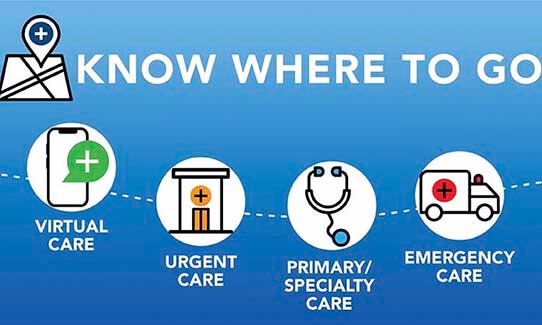



Summary
Making the right choice for the level of care you need can ensure you get the right care at the right place, the right time and the right price.
When faced with an unexpected health concern, deciding whether to rush to the nearest Emergency Room or seek help at an urgent care clinic can be a tough call. Let’s break down the key differences between urgent care, ER and primary care so you can make the best decision for your needs.
Urgent care is the best choice when you have a non-life-threatening illness or injury, but you need to be seen quickly.
Some common reasons to go to Urgent Care:
- Colds and flu
- Broken bones
- Sprains and strains
- Cuts that need stitches
- Animal or insect bites
- Mild fevers
- Unexplained rashes
- Minor injuries
- Earaches
- Sore throats
- Migraine headaches
- Nausea and vomiting
- Minor burns
- Urinary tract infections
- Bronchitis
- Sinus issues
- Cough
Our Urgent Care clinics offer extended and weekend hours, so it’s a good option when you need care after normal hours.
When to Go Straight to the Emergency Room
Immediately call 911 or seek care at your nearest Emergency Room for life-threatening conditions.
We know some people try to avoid the ER because of the fear of a long wait time or high cost, but sometimes emergency care is the right choice. If you are experiencing any of the following, go straight to your nearest ER:
- Severe chest pain
- Stroke symptoms
- Sudden weakness or numbness in the face, arm or leg
- Confusion
- Trouble speaking or understanding speech
- Difficulty walking
- Dizziness/loss of balance
- Severe headache
- Seizure
- Serious injury or burn
- Loss of consciousness
- Deep cut or bleeding that won’t stop
- Suicidal thoughts
- Difficulty breathing
- Severe abdominal pain
- Head injury or possible concussion
All of the above symptoms can indicate a life-threatening emergency where minutes count, and a stop at an urgent care or other provider can delay life-saving treatments.
When to Choose a Primary Care Provider
Whenever possible, your primary care provider is usually the best place to start. It’s important to have a relationship with a primary care provider who can help manage your health and coordinate your care. Primary care is the way to go for:
- Regular check-ups and preventive screenings
- Routine chronic medical condition management, including:
- Diabetes
- High blood pressure
- Sleep disorders
- Depression
- High cholesterol
- Common illnesses
- Chronic fatigue
- Chronic back pain
- Chronic cough or sinus issues
- Chronic abdominal pain
- History of migraine headaches
- Chronic vaginitis
- Chronic dizziness
I hope this helps you make the best decision when you need medical care. Making the right choice for the level of care you need can ensure you get the right care at the right place, the right time and the right price.


Dr. Kevin Johnson
Dr. Johnson says he chose health care to help others and improve the overall health of the community, and chose to work for West Tupelo Medical Clinic because of the good reputation and availability of ancillary services.
His hobbies include college sports, travel and spending time with his family.
Call 1-800-THE DESK (1-800-843-3375) or use our search to find a provider near you.

Subscribe to Our Newsletter
Like this content and want to get more? Sign up for True North, the health and wellness newsletter from North Mississippi Health Services!

Subscribe to Our Newsletter
Like this content and want to get more? Sign up for True North, the health and wellness newsletter from North Mississippi Health Services!

Nurse Link®
Not sure if you need Urgent Care or the ER? Call 1-800-882-6274 anytime to speak directly to a registered nurse and get immediate answers. Using computerized medical protocols, nurses direct callers to the most appropriate treatment. Our nurses are available 24 hours per day, seven days per week.